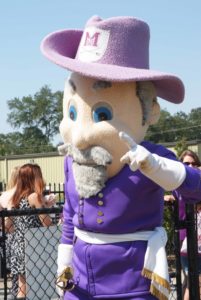
by Alex Melnick
arts & life editor
Academia is cool. (Academia also causes you to intensely analyze and question concepts like ‘cool…’ which is arguably a less cool aspect.) Dr. Eric Griffin, English professor, Latin American Studies professor, and notorious international jetsetter, recently proved this point when he was invited to attend a conference in Basel, Switzerland, about perceptions of Spain held by her competitors in the early Modern world.
The conference, entitled España ante sus Críticos: Claves de La Leyenda Negra—or Spain Before her Critics: Keys to the Black Legend—took place at the University of Basel Oct. 2-3, and was sponsored by the Netherlands Organization for Scientific Research, the Swiss Society for Hispanic Studies, and a consortium of European Universities. Dr. Griffin gave the keynote Oct. 2. To clarify this for those who do not believe in the righteousness of academia: Dr. Griffin got to go to a beautiful city halfway across the world to talk about something he’s very interested in. This is the academic equivalent of going to Dragon Con to chat about Game of Thrones with several hundred other obsessive fans, or France to talk about how dope cheese and wine is.
Basel is a German-speaking Swiss town, and is located where the borders of France, Switzerland, and Germany meet. This was Griffin’s first foray into Switzerland, and he said that his favorite part was the wonderful weather, and “being along the Rhine on a beautiful Saturday, watching people boat and water-ski.” He also remarked about the “wonderful collision of the old and new, [on the Rhine] where you’ll see a water skier or a jet skier come by and there will be a ferry that’s fixed up like it’s Medieval.”
A trip highlight was the pleasant surprise of discovering that one of his intellectual heroes, Desiderus Eramus, was buried at a cathedral Griffin visited. “The reason he was in that town when he died was that [Basel] was pretty much ideologically open at the time. If you had a book that had sensitive material, and you wanted it to be published, you went there.”
Griffin attended this Spain-centric consortium and explored how early Modern Germany, England, Portugal and many other nations interacted with Spain via academic keynote speeches. He was very interested in hearing the commonalties shared by early Modern nations in relation to their dealings with Spain, and the differences such as “Italy’s focus on Aragon and Catalon” and ideas about the New World. Griffin studies Anglo-Hispanic Literary History, and thus was intrigued by the intersections of his work in context with other early Modern Hispanic scholars. (Griffin has an interesting academic vantage point on this topic, as he is both an English faculty member and the director of Millsaps’ Latin American Studies department.) As the New World representative at the conference, Griffin noted there was not much of an Afro-centric or Asian perspective at the conference and that this perspective “mostly took a backseat to Western European policy.”
